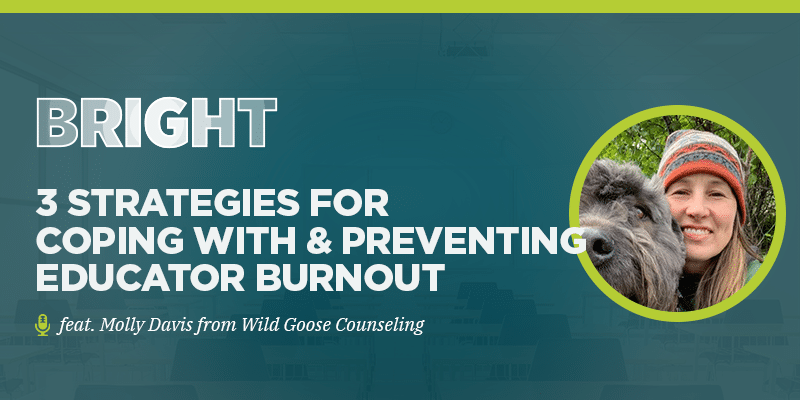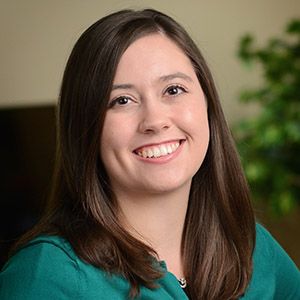Or listen on Apple, Spotify, Google, or another platform. Alternatively, you can read along with the transcript.
This episode is a personal one for me.
I first met Molly Davis through her popular Wild Goose Counseling Facebook page. So many of Molly’s “doodles” (as she affectionately refers to them) resonated with me so profoundly that I’d stop my mindless scrolling and gape at my newsfeed, thinking, “Wow, other people feel that way, too??”
After marveling at her doodles for months, I finally decided to enroll in Molly’s 8-week Beautiful Boundaries Bootcamp, which she describes as “designed for professional women who may cognitively understand what boundaries are but struggle to implement them in everyday life, work, and relationships.”
Needless to say, the experience was transformative, and I left empowered with many practical strategies and burgeoning friendships with other women across the globe undergoing similar journeys.
I invited Molly to speak with me on the BRIGHT podcast because a) she’s a delightful human being, and b) her lessons on boundaries seemed so relevant to the struggles with burnout I was hearing from educators.
Here’s a sneak peek at our conversation:
Many educators are helpers and givers. They’re drawn to the field of education to make a difference in the lives of their students.
The work/life boundaries in education were relatively permeable before the pandemic. But now more than ever, we’re seeing skilled and passionate educators who LOVE what they do choosing to leave the profession to protect their own physical and mental health.
In a 2021 survey, two out of three Michigan educators said they did not recommend education as a career path and had considered leaving their jobs during the 2020-21 school year.
Further reading: Teacher recruitment and retention in Michigan – Challenges and potential solutions
The many factors contributing to educator burnout are complex. Molly doesn’t claim to have all the answers, but she does offer an interesting perspective as a boundaries expert and a therapist who sees many teachers as clients.
Molly has an easy smile and a gentle warmth about her. It’s comfortable to relax in her presence. In our interview, she admitted, “I like pretty much love everybody I’ve ever worked with.”
It’s hard to walk away from a conversation with Molly without feeling just a little bit lighter. She has this extraordinary ability to make others feel seen, cared for, and empowered.
In her compassionate way, Molly reminds us that, ultimately, we must be the stewards of our energy and health or we will burn out when presented with situations that ask more of us than we can sustainably give.
Though the primary goal of this conversation is to offer strategies for individual educators, we would be remiss to focus exclusively on the individual educator and not the systems that support them. Molly and I devote some time to exploring how widespread burnout in the teaching profession can be seen as a red flag in the need for systemic change.
In this episode of the BRIGHT podcast, Molly dives into the relationship between boundaries and burnout, shares a bit of wisdom about how she walks this line as a professional counselor, and offers three strategies for coping with and preventing educator burnout.
You can listen to my conversation with Molly using the audio player above or by subscribing to the BRIGHT podcast in your app-of-choice (find us on Apple, Spotify, Google, and more) or by reading along in the transcript.
Of course, we understand that educators are busier than ever and that many are struggling with burnout. Suppose you don’t have time to listen to Molly’s full episode (which offers the fuller effect of her wisdom, energy, and examples), you can still benefit from a glimpse at some of my favorite quotes from Molly and her top three tips for coping with and preventing educator burnout below!
3 tips for coping with & preventing educator burnout
- Remember that you are a renewable resource
It can be helpful to think of yourself, for example, like a bamboo forest. You have an ever-filling energy bucket inside of you, but it needs time to refill. If you pour yourself out trying to meet all the needs, you will burn out, and the needs will still be there. In the long run, you will meet way more needs when treating yourself sustainably than when you give to the point of exhaustion and burnout.
- Treat yourself sustainably
Especially in education, carving out healthy work-life boundaries can be really tricky. However, Molly lovingly reminds us that if we don’t treat ourselves sustainably, we will burn out. When work asks a lot of you, she says, it can be helpful to balance out your life with things that do the opposite. Everybody is different, but ultimately, it is up to us to determine what is needed for our own replenishment.
- Use burnout as a catalyst for change
Burnout can be a catalyst for needed change. When you’re experiencing burnout, it’s essential to investigate why. What are you doing that you don’t like? What are you doing that you do like? How can you do more of the things you love and less of the things you don’t? Even though burnout is an incredibly unpleasant experience, it can be a gift if it ultimately leads to us living a life in greater alignment with our passions, joys, and values. Figure out what this looks like for you, Molly says, “and get thee that way.”
My favorite quotes from this episode
“The kids will always be there. The needs will always be there. The workload will always be there. All of this stuff doesn’t go away. If you pour yourself out for the next semester and give every single thing you’ve got to give, there will still be needs. When you’re completely depleted, there will still be needs. If you make it your job to meet all the needs, if that’s the boundary for you, to meet every last need, there will be no renewing of you. It’s unsustainable, and you will burn out. But if you think of yourself as a renewable resource, like a bamboo forest, then you can harvest it, use it, and that’s fantastic, but it needs some time to come back up. If you can start thinking about using yourself sustainably, then you can meet some needs, and you will meet way more needs that way than you will meet if you pour yourself out to the point of exhaustion.”
“If you don’t want to burn out — I don’t mean to be harsh here, I’m saying this lovingly but with firmness — it doesn’t matter: You have to do something, or you will burn out. There has to be somewhere in there where you are remembering, ‘I am a renewable resource, so I have to renew.’”
“It was very counterintuitive [as a professional counselor], and at first, I felt like I was being a real jerk… but I decided that I can care, and I can give 100% of myself from three o’clock to four o’clock when I see Jenny (I’m just making up a name here), but if I take Jenny with me, in my heart and in my mind, if she goes past three o’clock, then I’m not going to be here next year to help Jenny further or to help any other Jennys that may come along.”
“When you as an educator are caught in a situation where you are using every healthy coping skill that you possibly can, and there’s just simply no way not to burnout because the pressures on your shoulders are just too much, then that’s not on you… Part of having good boundaries is understanding what is your responsibility and what isn’t your responsibility. Sometimes, it’s just nice to remember that this is actually supposed to be the system’s job, and my system isn’t doing it. I am just one little human. I can’t do what a greater system is supposed to do.”
Special discount for BRIGHT podcast listeners
There is a special discount for BRIGHT podcast listeners who sign up for Molly’s boundaries program. Mention this podcast and enjoy two extra weeks of live boundaries coaching added to your program package at no additional cost. That’s 5 additional hours of live coaching help for free.
Related resources
- Watch: Molly’s free introductory boundaries course
- Follow: Wild Goose Counseling on Facebook (therapy-related content and memes)
- Follow: Boundaried Bootcamp on Facebook (daily boundaries doodles and related content)
- Follow: Boundaried Bootcamp on Instagram (daily boundaries doodles and related content)
- Learn & earn: Take care of yourself: A course in wellbeing and self-care (Free 3-SCECH PD course)

